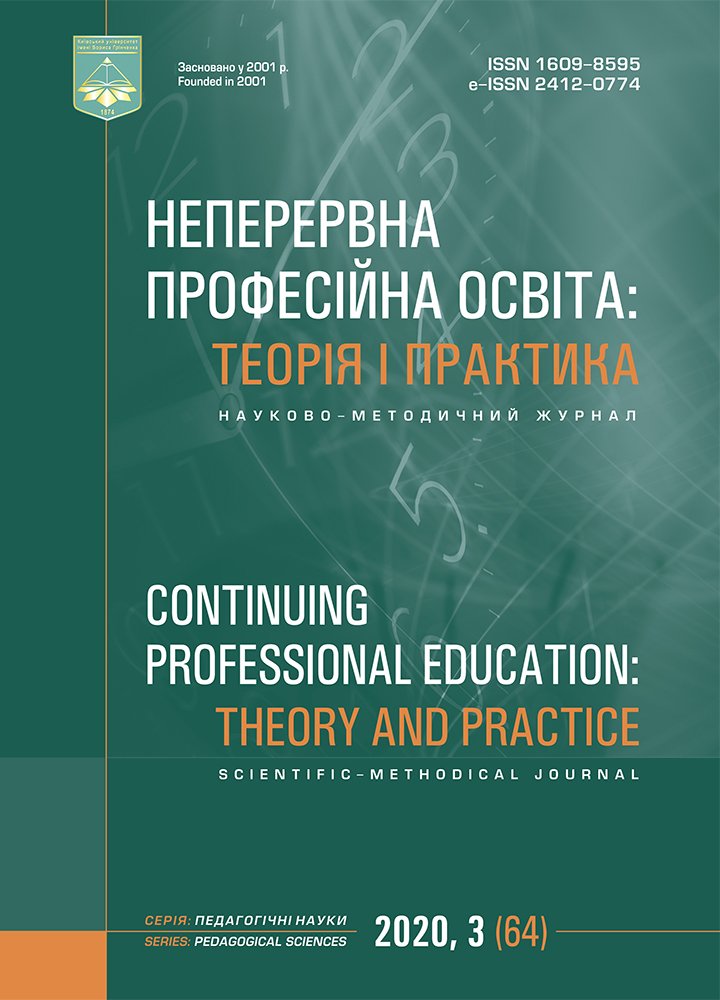PROFESSIONALS OF THE XXI CENTURY. CIRCULAR ECONOMY
DOI:
https://doi.org/10.28925/1609-8595.2020.3.5Keywords:
environment, recycling, sustainability, professional in circular economics, circular economyAbstract
The article considers the problem of training professionals in a fundamentally new direction for Ukraine, namely professionals in circular economy; reveals the economic essence and meaning of the concept of «circular economy»; historical aspects of its formation are analysed; importance for sustainable development of society, the environment protection, human health. Circular, or closed-loop economy – a model of economic development, the basis of which is the rational use of resources and their recovery; it is based on extending the product life cycle, restoring resources, recycling, switching from fossil fuels to using renewable energy sources. Thus, a regenerative, regenerative and integrated circular economy aims to support sustainable economic development without harming the environment. The article concludes that the implementation of the ideas and principles of the circular economy requires the training of professionals of the new formation with the appropriate level of environmental awareness and understanding of the needs of sustainable development of society. Such specialists must not only have a perfect economic education, but also understand the issues of production, be able to respond quickly to the problems of environmental protection and human health, and have an active civil position. In the leading countries of the world professional training of experts in circular economy is already carried out. It is absent in Ukraine today. Thus, in the conditions of growing consumption, accumulation of mass of waste, which cannot be quickly processed in the natural environment and have a harmful impact on the environment, the problem of professionals training in the circular economy in Ukraine needs an immediate solution.References
Artemenko, L. P. (2015). Cirkulyarna ekonomika promislovosti Kitayu. [China’s circular economy industry.]. Kitajska civilizaciya: tradiciyi ta suchasnist. Perspektivi socialno-ekonomichnogo ta politichnogo rozvitku KNR v XXI stolitti: Materiali IX naukovoyi konferenciyi (22 veresnya 2015 r.). (pp. 7–10). KNEU. https://ir.kneu.edu.ua/bitstream/ handle/2010/21669/7-11.pdf?sequence=1&isAllowed=y
Vsyo, chto nuzhno znat o cirkulyarnoj ekonomike [Everything you need to know about the circular economy]. http:// novopol.ru/ vse-chto-nuzhno-znat-o-cirkulyarnoj-ekonomike.html
Ekonomika zamknenogo ciklu [Closed cycle economics]. https://uk.wikipedia.org/wiki/
Ilina, A. I. (2018). Cirkulyarnaya ekonomika i cirkulyarnye biznes-modeli: kvalifikacionnaya rabota [Circular economics and circular business models: qualification work]. SPbGU. http://elib.spbstu.ru/dl/2/v18-6747.pdf/download/ v18- 6747.pdf
Pahomova, N. V., Rihter, K. K., Vetrova, M. A. (2017). Perehod k cirkulyarnoj ekonomike i zamknutym cepyam postavok kak faktor ustojchivogo razvitiya [Transition to a circular economy and closed supply chains as a factor of sustainable development]. Vestnik Sankt-Peterburgskogo universiteta. Ekonomika, 33, 2, 244–268.
Potapenko, V. G. (2012). Strategichni prioriteti bezpechnogo rozvitku Ukrayini na zasadah «zelenoyi ekonomiki»: monografiya [Strategic priorities for the safe development of Ukraine at the ambush of the «green economy»: monograph] / Hlobistov Ye. V. (Ed.). NISD.
Brutyan, M. M…. Terziev, V. / Chernov, S. S. (Ed.) (2016). Problemy sovremennoj ekonomiki: monografiya [Problems of modern economics: monograph]. Izd-vo CRNS.
Sazonova, T. (2016). «Industriya 4.0»: idealnaya ekonomika [«Industry 4.0»: ideal economy]. http://peretok.ru/nets/ industriya-4-0-idealnaya-ekonomika.html
Sergiienko, L. (2016). Stan naukovih doslidzhen z problem cirkulyarnoyi ekonomiki [The state of scientific research on circular economy]. Derzhavne upravlinnya: udoskonalennya ta rozvitok, 12. http://www.dy.nayka.com. ua/?op=1&z=1020
Timoshenko, I. L., Dronova, O. L. (2018). Cirkulyarna ekonomika dlya umov Ukrayini [Circular economy for the minds of Ukraine]. Formuvannya rinkovih vidnosin v Ukrayini, 9, 120–127. 10.5281/zenodo.1485209
Homenko, O. V. (2018). Cirkulyarna ekonomika – osnova stalogo rozvitku KNR [Circular economy is the basis of China’s steel development]. Ukrayina – Kitaj, 12. https://sinologist.com.ua/homenko-o-v-tsyrkulyarna-ekonomika-osnova-stalogo-rozvytku-knr/
Cirkulyarna ekonomika ta perevagi dlya suspilstva. Zvit pro doslidzhennya na vimogu Rimskogo klubu za pidtrimki Fondu MAVA [Circular economy and reloading for suspension. Report about the message to the Roman club for the support to the MAVA Foundation] (2017). http://www.clubofrome.org.ua/wpcontent/uploads/2017/08/The-Circular-Economy-CoR_UA-2.pdf
Banaitė, D. (2016). Towards circular economy: analysis of indicators in the context of sustainable development.
Social Transformations in Contemporary Society, 4, 142–160. http://stics.mruni.eu/wp-content/uploads/2016/07/ STICS_2016_4_142-150.pdf
Bocken, N. M. P., Olivetti, E. A., Cullen, J. M., Potting, J., Lifset, R. (2017). Taking the Circularity to the Next Level: A Special Issue on the Circular Economy. Journal of Industrial Ecology, 21 (3), 476–482. https://doi.org/10.1111/ jiec.12606
Carson, R. (1962). Silent Spring. Houghton Mifflin Company.
Demin, Ch. Core of recycling economy is to use resources circularly. China Population, Resources and Environment. 2004. № 14 (2). Р. 12–15.
Fernandes, A. G. (2018). A Social Inclusive Circular Economy, is it possible? https://www.cep-americas.com/single-post/2018/08/26/A-Social-Inclusive-Circular-Economyis-it-possible
Heshmati, A. (2017). Review of the circular economy and its implementation. International Journal of Green Economics, 11 (3/4). 10.1504/IJGE.2017.089856
Pearce, D. W., Turner, R. K. (1989). Economics of Natural Resources and the Environment. Johns Hopkins University Press. https://www.amazon.com/Economics-Natural-Resources-EnvironmentPearce/dp/0801839874
Towards the Circular Economy: Accelerating the scale-up across global supply chains (2014). World Economic Forum. http://www3.weforum.org/docs/WEF_ENV_TowardsCircularEconomy_Report_2014.pdf
Towards a Circular Economy: Business Rationale for an Accelerated Transition. MacArthur Foundation (2015). https:// www.ellenmacarthurfoundation.org/assets/downloads/TCE_EllenMacArthur-Foundation-9-Dec-2015.pdf
Downloads
Published
How to Cite
Issue
Section
License
Copyright (c) 2020 Sysoiev Oleksii

This work is licensed under a Creative Commons Attribution-NonCommercial 3.0 Unported License.



